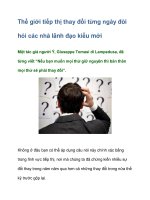reported speech with infinitive gerund
Bạn đang xem bản rút gọn của tài liệu. Xem và tải ngay bản đầy đủ của tài liệu tại đây (137.95 KB, 4 trang )
<span class='text_page_counter'>(1)</span>Pre: Teach:. REPORTED SPEECH WITH INFINITIVE AND GERUND. Week: Period:. Thì thay đổi như sau: 1.Hiện tại đơn (Simple Present) → Quá khứ đơn (Simple Past) 2.Hiện tại tiếp diễn (Present Continuous) → Quá khứ tiếp diễn (Past Continuous) 3.Hiện tại hoàn thành (Present Perfect) → Quá khứ hoàn thành (Past Perfect) 4.Quá khứ đơn ( Simple Past) → Quá khứ hoàn thành (Past Perfect) 5.Quá khứ tiếp diễn (Past Continuous) → Quá khứ hoàn thành tiếp diễn ( Past perfect Continuous) 6.Tương lai đơn (Simple Future) → Tương lai ở quá khứ ( Future in the past : Would + V) 7.Tương lai hoàn thành (Future Perfect) → Điều kiện hoàn thành ( Perfect Conditional ) 8.Điều kiện ở hiện tại ( Present Conditional) → Điều kiện hoàn thành ( Perfect Conditional ) * Lưu ý : Quá khứ hoàn thành (Past Perfect ) , và điều kiện hoàn thành ( Perfect Conditional) vẫn ko đổi. _ Chuyển trạng từ chỉ nơi chốn và thời gian theo quy luật Chú ý : Màu nâu là dùng cho Câu nói trực tiếp màu đỏ là câu tường thuật This ----> That These ---- > Those Now ----> Then Here ----> There Today ----> That day Tomorrow ---> The next day / The following day / The day after Yesterday ----> The day before / The previous day Next week , month year ----> The following week / month / Year Last night/ week/ month/ year ---> The night/ week/ year before hoặc the previous night/ week / month/ year Tonight ----> that night Ago ----> earlier / Before ( Ex : 2 days ago ----> 2 days before / earlier ) + Chú ý : _Sau động từ TELL bao giờ cũng phải có 1 bổ túc từ trực tiếp ( TELL + Object) Ex : An said to me : " I will buy a car" => An told me that he would buy a new car ( An bảo tôi rằng anh ta muốn mua 1 chiếc xe mới ) * Trong câu tường thuật , động từ khiếm khuyết MUST thường đc chuyển thành HAD TO , NEEDN'T chuyển thành DID NOT HAVE TO , nhưng MUST , SHOULD , SHOULDN'T khi chỉ sự cấm đoán , lời khuyên vẫn được giữ nguyên VD : 1. His father said to him : "You must study harder" => Hisfather told him that he had to study harder ( Bố cậu ta bảo rằng cậu ta phải học chăm hơn ) 2. Hoa said :"You needn't water the flowers because it rained last night" => Hoa said that he didn't have to water the flowers because it had rained the day before (Hoa nói rằng anh ấy ko cần phải tối hoa vì đã mưa vào tối hôm trước) 3. The doctor said to Nam : "You should stay in bed" => The doctor told Nam that he should stay in bed ( Vị bác sĩ bảo Nam rằng cậu ta nên ở trên giường) * Vài cách chuyển đại từ nhân xưng và tính từ sỡ hữu từ câu nói trực tiếp sang câu tường thuật . I → He /She Mine → His / Hers We → They Ours → Theirs Me / You → Him /Her My → His / Her Us → Them Our → Their Myself → Himself / herself.
<span class='text_page_counter'>(2)</span> * GERUND, INFINITIVE & CONDITIONAL SENTENCES IN REPORTED SPEECH 1. REPORTED SPEECH WITH GERUND: - Khi lời nói trực tiếp là lời đề nghị, lời chúc mừng, lời cảm ơn, lời xin lỗi,… động từ tường thuật cùng với danh động từ ( V_ing ) theo sau nó thường được dùng để chuyển tải lời nói trên. - Tùy theo nhóm động từ tường thuật (reporting verbs), ta có các vị trí của danh động từ như sau: * Reporting verb + (someone) + preposition + Gerund … Thank someone for Warn someone against Apologize (to s.o) for Accuse someone of Dream of Insist on Congratulate someone on Object to complain about Prevent someone from Look forward to Ex: + “I’m happy to know that you win the game. Congratulations!” Jim said to Mary. → Jim Congratulated Mary on winning the game. + Peter said, “I want to be a famous singer worldwide.” Peter dream of being a famous singer worldwide. * Reporting verb + Gerund … Deny admit suggest regret Appreciate (đánh giá cao, cảm kích) Ex: + Peter said, “ I didn’t steal the painting. It’s not me”. Peter denied stealing the painting. Danh động từ thường đi theo động từ tường thuật SUGGEST (đề nghị) trong các mẫu câu đề nghị sau: a) Why don’t you / Why not / How about → Suggested + ( someone ) + V-ing Ex: + “ Why don’t you send her some flowers?” he said. He suggested me sending her some flowers. + “Why not forward her the message?” I said to him. I suggested him forwarding her the message. b) Let’s / Let’s not → suggested + V-ing / suggested + not + V-ing Ex: + “Let’s meet outside the cinema,” he said. He suggested meeting outside the cinema. + “Let’s not talk about that problem again,” he said. He suggested not talking about that problem again. c) Shall we / It’s a good idea → suggested + V-ing. Ex: + ‘It’s a good idea to send her some flowers,” he said. He suggested sending her some flowers. Exercise: Change these sentences into indirect speech: 1. “I’m terribly sorry. I have broken a vase,” he said to his mother. …………………………………………………………………………………. 2. “Why don’t you sell your old house?” My friend said to me. ................................................................................................................................... 3. “Thank for your kindness of letting us stay with you,” said the man. ………………………………………………………………………………………. 4. “I hear that you have won the game spectacularly. Congratulation,” Anna said. ………………………………………………………………………………………. 5. “ Let’s not mention this problem again,” the old man said ……………………………………………………………………………………….. 2. REPORTED SPEECH WITH INFINITIVE: Khi lời nói trực tiếp là lời đề nghị, mệnh lệnh, ý định, lời hứa, lời yêu cầu…, động từ tường thuật cùng với động từ nguyên mẫu theo sau nó thường dược dung để chuyển tải nội dung lời nói trên. Tuỳ theo nhóm động từ tường thuật (Reporting verbs), ta có các vị trí của động từ nguyên mẫu (to V) như sau: * Reporting verbs + Object + to_infinitive + … ask advise command expect instruct invite order persuade recommend encourage remind tell urge warn want Ex: “Don’t forget to lock the door,” I said to my sister. → I remind my sister to lock the door..
<span class='text_page_counter'>(3)</span> * Reporting verbs + to_infinitive… Agree demand guarantee hope promise swear threaten volunteer offer refuse consent(bằng lòng) decide Ex: “ I’ll give you my book if you need it,” my friend said to me. → My friend offered to give me his book if I needed it. Động từ nguyên mẫu thường đi với các mẫu câu đề nghị, lời mời, lời khuyên…cụ thể sau : a) Lời đề nghị: Would you mind + V_ing/ Do you mind + Ving → asked + s.o + to V Would you/ Could you/ Will you/ Can you → asked + s.o + to V Ex1: “Would you mind opening the doors?” → He asked me to open the doors. Ex2: “ Can you read the instructions again?” she said. → She asked me to read the instructions again. b) Lời mời: Would you like/ Will you → invited + s.o + to V Ex: “Will you have lunch with me?” he said. → He invited me to have lunch with him. c) Lời khuyên: Had better/ If I were you/ Why don’t you → advised + someone + to V Ex: + “If I were you, I would phone her,” I said. → I advised him to phone her Exercise: Change these sentences into indirect speech: 1. “Would you like to have coffee with me?” John said to his workmate. ………………………………………………………………………………………………... 2. “Why don’t you decorate your house?” my friend said to me. ………………………………………………………………………………………………... 3. “If I were you, I would revise for that exam,” said the tutor. ………………………………………………………………………………………………... 4. “I’ll help you with this homework,” my brother said. ………………………………………………………………………………………………... 5. “Would you sign the contract?” the secretary said to me. ……………………………………………………………………………………………….... 3) CÂU ĐIỀU KIỆN TRONG LỜI NÓI GIÁN TIẾP: Nếu trong lời nói trực tiếp có câu điều kiện, thì chỉ có câu điều loại I là có sự thay đổi về THÌ, hai loại câu diều kiện còn lại thì vẫn giữ nguyên hình thức động từ của chúng. Ex: + “If I have a time, I will visit her,” he said. He said that if he had time, he would visit her + “ If I were in New York now, I would visit her,” he said. He said that if he were in New York then, he would visit her. + “ If I had met her, I would have told her the truth,” he said. He said that if he had met her, he would have told her the truth. * Exercises: I. Complete the following sentences without changing their meanings: 1. The doctor said to me, “You should lose weight.” The doctor advised me ...................................................................... 2. Mary said, “Let’s go to a movie.” Mary suggested ................................................................................. 3. “I didn’t break the windows”, Bill said. Bill denied ......................................................................................... 4. “You told a lie, Tom”, she said. She accused Tom .............................................................................. 5. “I can’t go to your birthday party next Saturday evening, Jack”, said Mary. Mary apologized for........................................................................... 6. “I won’t help you with your homework. Never ! ” Jane said to me. Jane refused ....................................................................................... 7. Joe said, “Please come to my party.” Joe invited.......................................................................................... 8. Mr. Gray said, “Don’t play in the street.”.
<span class='text_page_counter'>(4)</span> Mr. Gray warned the children not ..................................................... 9. “Would you like to come on a picnic with us? They invited ...................................................................................... 10. “Please don’t tell anybody what happened.” He asked ............................................................................................ 11. “If you don’t give me a pay rise. I’ll resign.” She threatened ................................................................................... 12. “I’ll finish the work by the end of this week.” John promised ................................................................................... 13. “You ought to take a break, Andrew.” She advised........................................................................................ 14. “Don’t forget to go to the supermarket after work.” They reminded .................................................................................. 15. “Why don’t we sing a few songs?” He suggested…………………………………………… 16. She told me, “ I am going to the party with my mother”. She told me………………………………………………. 17. They said, “ We have plenty of time to do our work”. They said………………………………………………… 18. He said, “ This is the book you have been looking for”. He said…………………………………………………… 19. “When did they tell you that?” They wanted to know…………………………………….. 20. “Have you seen the new film?” They wanted to know…………………………………….. 21. “Don’t put your elbow on the table.” She told…………………………………………………….. 22. “Write your name clearly on the top.” He asked…………………………………………………….. 23. “Don’t wipe your dirty fingers on my clothes.” He ordered………………………………………………….. 24. “Wait here under the tree until the rain stops.” He asked……………………………………………………. 25. “Come and see me whenever you have a few hours to spare.” She told……………………………………………………...
<span class='text_page_counter'>(5)</span>









